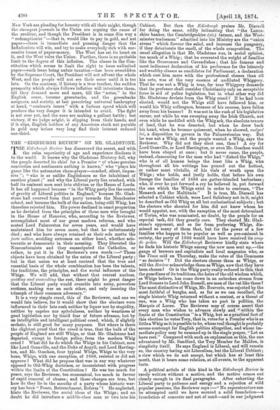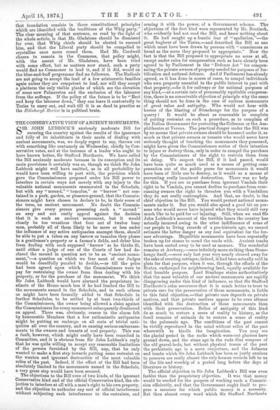THE "EDINBURGH REVIEW" ON MR. GLADSTONE. T HE Edinburgh Review has
discovered the secret, and with the calm superiority of age and experience discloses it to the world. It knows why the Gladstone Ministry fell, why the people deserted its chief for a Premier " of whose genuine conviction and sentiments nothing is known," who "plays his game like the automaton chess-player—masked, silent, impas- sive "; "who is as unlike Englishmen as the inhabitant of another planet ;" and why the Liberal party lies crushed, with half its eminent men sent into oblivion or the House of Lords. It has all happened because "in the Whig party lies the centre of gravity of Liberal politics in England," because Mr. Glad- stone had swerved from that party towards the Manchester school, and because the bulk of the nation, being still Whig, has therefore rejected him. His power declined in exact proportion as he deviated from the principles of those men who brought in the House of Hanover, who, according to the Reviewer, accomplished most of our great modern reforms, and who seated Lord Palmerston for seven years, and would have maintained him for seven more, but that he unfortunately died; and who have always retained as their sole motto the juste milieu, avoiding extremes on either hand, whether aris- tocratic or democratic in their meaning. They liberated the Nonconformists and they emancipated the Catholics, or rather, to put it in the Reviewer's own words :—" Those objects have been obtained by the union of the Liberal party ; but in that union we at least contend that the true and essential basis of the whole combination has been the talents, the traditions, the principles, and the social influence of the Whigs. We will add, that without that central nucleus, guiding and controlling the rest, there might be great danger that the Liberal party would crumble into noisy, powerless sections, making war on each other, and only insuring the triumph of their common adversary."
It is a very simple creed, this of the Reviewer, and one we would fain believe, for it would show that the electors were influenced in their late rush neither by liquor nor by stupidity, neither by caprice nor spitefulness, neither by weariness of good legislation nor by timid fear of future advance, but by an intelligible and intelligent political creed, which, if slightly archaic, is still good for many purposes. But where is there the slightest proof that the creed is true, that the bulk of the people of England are still Whigs, or that Mr. Gladstone had departed, except in foreign policy, from the modern Whig creed ? What did he do which the Whigs in his Cabinet, men like Lord Granville, and the Duke of Argyll, and Lord Harting- ton, and Mr. Goschen, four typical Whigs, Whigs to the very bone, Whigs, with one exception, of 1688, resisted or did not approve ? What did he propose that was in any way whatever opposed to Old-Whig doctrines, or inconsistent with progress within the limits of the Constitution ? He was too much for peace, says the Reviewer, too economical, too much in favour of rapid removal of abuses ; and these charges are true, but how do they lie in the mouths of a party whose historic war- cry has been "Peace, Retrenchment, Reform"? He neglected, hints the Reviewer, the social ideas of the Whigs ; and no doubt he did introduce a middle-class man or two into his Cabinet. But then the Edinburgh praises Mr. Disraeli for doing the same, oddly intimating that "the Lanca- shire banker, the Cambridgeshire (sic) farmer, and the West- minster tradesman" admitted into his Ministry are the "onion atoms" which flavour the salad, and increase the pungency, if they deteriorate the smell, of the whole composition. The usual allegation is that Mr. Gladstone was, in social opinion, too much of a Whig ; that he overrated the weight of families like the Grosvenors and Cavendishes ; that his famous and most indiscreet declaration of his prcference for the leisurely and wealthy classes as candidates for Parliament, a declaration which cost him more with the professional classes than all his acts, was of the very essence of undiluted Whiggery. That he was not a Whig is true, for true Whiggery demands that its professor shall consider Christianity only an acceptable force in aid of police legislation, but in what other way did Mr. Gladstone deviate from the Whig creed ? If he had been elected, would not the Whigs still have followed him, or would his Whig colleagues, because of his success, have fallen away from his banner? It was not in the rush of his legislative career, not while he was sweeping away the Irish Church, not even while he meddled with the Whig ark, the absolute tenure of land, that he was deserted, but when he drew back his hand, when he became quiescent, when he showed, nta/gre /iii, a disposition to govern in the Palmerstonian way. But he was not a Whig, and the people wanted a Whig, says the Reviewer. Why did not they elect one, then ? A cry for Lord Granville, or Lord Hartington, or even Mr. Goschen would have been obeyed at once ; but it never came, the people, instead, clamouring for the man who had "dished the Whigs," who is of all human beings the least like a Whig, who throughout all his writings has poured out the hottest, or rather most vitriolic, of his vials of wrath upon the Whigs ; who holds, and justly holds, that before his own lineage the families of 1688 are gutter-blooded barbarians ; who, if ever he put forward a cry he believed in, put forward the one which the Whigs exist in order to contemn, "The
Monarch and the Multitude." It is true, Mr. Disraeli has selected a Cabinet which, were Lord Salisbury not in it, might be described as Old Whig on all but ecclesiastical subjects ; but the electors who shouted for him did not know whom he would appoint, nor, with the exception of the most determined of Tories, who was nominated, no doubt, by the people for an especial task, did they greatly care. They elected Mr. Glad- stone's opponent, and so far from preferring Whigs, dis- missed so many of them that, but for the power of a few families who happen to be popular as well as pre-eminent in society, the party of 1688 would have have received its coup de grace. Will the Edinburgh Reviewer kindly state where he finds his historic Whigs among the new men sent up,—the gangs of brewers and capitalists and local magnates who, as the Times said on Thursday, make the votes of the Commons "so decisive " ? Did the electors choose them as Whigs, or will the Review acknowledge them as Whigs, now that they have been chosen? Or is the Whig party really reduced to this, that the guardians of its traditions, the heirs of the old wisdom which, as Whigs believe, has come down in an unbroken stream from Lord Somers to Lord John Russell, are men of the vat like these ? The most distinctive of Whigs, Mr. touverie, was rejected by the most faithful of burghs, and, as far as we can recollect, the single historic Whig returned without a contest, or a threat of one, was a Whig who has taken no part in politics, the Marquis of Lorne. The Reviewer may of course assert that every man who wishes to advance slowly and "within the limits of the Constitution "is a Whig, but as a practical fact of this election he votes Tory, that is, votes for a Premier who is as little a Whig as it is possible to be, whose real thought is probably serene contempt for English politics altogether, and whose im- mediate policy may be summed up in the single prayer, "Let 118 have rest." Compared with such an explanation as this, the one adventured by Mr. Sandford, the Tory Member for Maldon, is simplicity itself. He says England is Liberal, and will remain so, the country hating not Liberalism, but the Liberal Cabinet ; a view which we do not accept, but which has at least this merit, that it bears some relation, at all events, to the apparent facts.
A political article of this kind in the Edinburgh Review is rarely written without a motive, and the motive comes out clearly enough in its final paragraphs. After exhorting the Liberal party to patience and energy and a rejection of wild popular passions, the Reviewer says :—" No superstructure can be attempted until we have secured a solid foundation—a foundation of concrete and not of sand—and in our judgment that foundation consists in 'those constitutional principles which are identified.with the traditions of the Whig party." The clear meaning of that sentence, as read by the light of the whole article, is that Mr. Gladstone should be dismissed for ever, that Whig chiefs should be elected to succeed him, and that the Liberal party should be compelled to crystallise once more round them. Had Mr. Cardwell chosen to remain in the Commons, that policy might, with the assent of Mr. Gladstone, have been tried with some effect, but as matters now stand, such a party would find no Commoner to lead it, and if it did, would on the blue-and-buff programme find no followers. The Radicals are not going to accept the lead of a few aristocratic families again unless they are competent to lead, nor will they accept a platform the only visible planks of which are the elevation of some new Palmerston and the exclusion of the labourer from the suffrage. If the policy of the future is to be•"Rest and keep the labourer down," they can leave it contentedly to Tories to carry out, and wait till it is as dead in practice as the Edinburgh Review is in political brain.



































 Previous page
Previous page